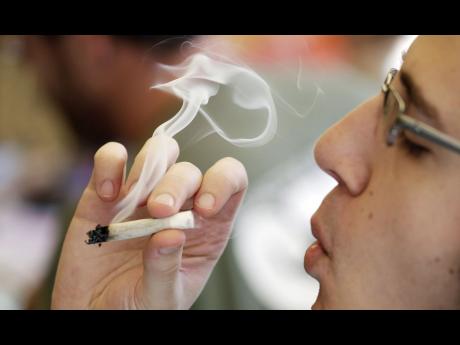Walking away from weed - Pressured into smoking ganja at 12 years old, four years later teen decides to stop lighting up
At 12 years old, Orlando* started smoking ganja because a man in his community told him the ink from the book leaf he often lighted up would cause him to go crazy.
"One of the big man dem see me and said, 'you mustn't smoke paper bredda, if you are going to smoke, you must smoke weed'," recounted Orlando.
"He handed it to me and I said no, so I walked off, and then the next day a different youth came (with the ganja). I was 12 and he was about 15 or 16. Me and him 'par', we are like family," said Orlando as he recounted his first step into smoking ganja.
Now 16 years old, Orlando has finally managed to kick his smoking addiction with the help of a senior judge, treatment officers, counsellors and other service providers who work with the Children Drug Treatment Programme (CDTP), which was established by the Kingston and St Andrew Family Court in 2014.
The average age of first use of ganja in Jamaica is 12 years old, and 90 per cent of the adolescents seen in the National Council on Drug Abuse's (NCDA) treatment programme are referred due to problems associated with the use of the weed.
SIDE EFFECTS
Orlando, like several other Jamaica youngsters, was pressured into smoking ganja, and while some youngsters do not display any adverse symptoms, this was not the case for him.
"It let me feel paranoid. I didn't trust people. If somebody come around me, I watch him. If somebody said something to me, I would just think, is what that him just say? It cause me to want to war and do certain things," Orlando told The Sunday Gleaner.
"I do my work same way, but if I am in a class and the teacher in the class and somebody romp with me, I don't too care if the teacher is in the class I would just fight them," he said.
The youngster admitted that he has been given numerous suspensions from school, but come September, he hopes to show school administrators that he has turned over a new leaf.
"I am on chalk line," said the teen who wants to join the Jamaica Defence Force or become a welder in the future.
Orlando lives with his grandmother as his mother migrated to the United States when he was three years old and never looked back. His father doesn't live with him, but assist financially.
"People never know that I was smoking because to how I acted in the community, the people them take me for a saint 'cause I don't do certain things. So when I buy it, I would hide somewhere and smoke it," he said.
Last November, Orlando decided that he wanted to stop smoking after he was arrested for taking part in a robbery.
Orlando claimed it was a case of being at the wrong place at the wrong time, as he had no idea his friend had planned to rob a lady while they were hanging out one day.
"He told me we were going to look some girls," said the teen who served time at the Metcaffe Street Secure Juvenile Centre.
COUNSELLING SESSIONS
Under the CDTP, Orlando had to attend counselling sessions and was given a drug test every week.
His attendance was crucial to him being considered for graduation, which he did along with four other male teens recently. There are 30 other students still trying to graduate from the programme.
Treatment officer at the NCDA, Rochelle Whyne-Ferguson, said that she interfaces with three types of children through the programme.
"You have the children who come to us who are not aware that they have a substance misuse problem, you have individuals who are aware that they have a problem but they do not acknowledge or accept that they have a problem.
"The third set of individuals I find are the ones who recognise and accept that they have a problem, but they have a difficulty in starting the recovery journey," said Whyne-Ferguson.
"As treatment counsellors, our primary role is to provide support, education and non-judgemental confrontation," she said.
Whyne-Ferguson noted that Orlando falls in the third category, because he has accepted that he has a problem. In fact, she describes him as an "exceptional case".
"He is very consistent, he is very positive and he is working for the summer now and will be moving on to grade 11," she said.
Orlando admits that it is very difficult to not give in to peer pressure and go back to smoking, but he said the treatment officers have acted like his mother and they continue to encourage him to not give up.
* Name changed on request

